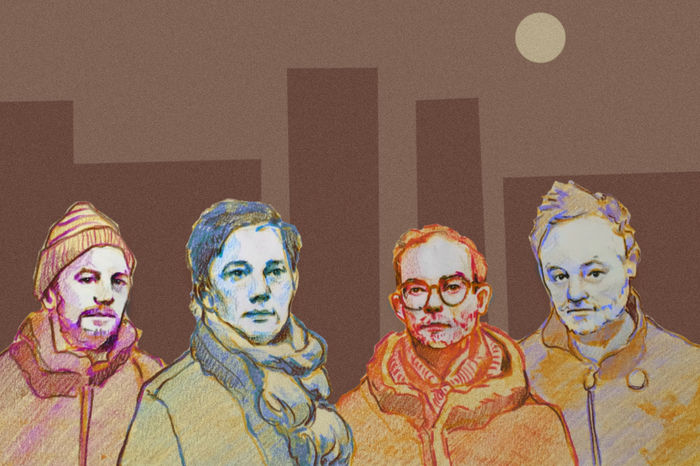Black Country, New Road on being ‘the best band in the world’
Anuk Weerawardana and Wilf Vall talk to the enigmatic outfit about reinvention, experimentation, and their Cambridge roots

If you’re reading this, there’s a good chance you’re a Cambridge student, and if you’re a Cambridge student there’s a good chance you’ve heard of Black Country, New Road, or – if you’re like us – have been mildly obsessed with the band since their debut studio album For the first time released in early 2021.
Featuring sombre tracks like ‘Athens, France’ and the gut-wrenching ‘Sunglasses,’ the album hosted a unique sound, ranging from jazz to post-rock via klezmer. The band then went on to release their critically claimed “art rock meets chamber pop” magnum opus Ants from Up There which debuted at number three on the UK Albums Chart. The album’s success was bittersweet, coming with the amicable departure of the band’s frontman and co-founder Isaac Wood and questions around the bands future. Any questions were quickly answered by Live at Bush Hall; a live album featuring the recording of performances of original songs at Bush Hall, London. Now the band are back with their third, highly anticipated studio album: Forever Howlong.
Considering the band’s popularity with Cambridge students, it feels fitting that their journey started in the city. The band all grew up and went to school here, with the band’s drummer, Charlie Wayne, reflecting on their overlap at school: “Half of us went to Long Road, half of us went to Hills Road”. The band’s early days were a local affair too, with saxophonist, fluatist, and occasional frontman Lewis Evans reminiscing on how the band first started playing in Charlie’s childhood bedroom – a room he recognises as his Zoom background instantly. Both bandmates seemed proud of their Cambridge ancestry as Charlie went on to explain how the city’s relatively small music scene was perfect for budding musicians: “[you could find] people who were […] interested in similar music fairly easily than if we were maybe based in somewhere bigger, like London, or Manchester, or maybe even like Bristol”. However, the band’s unique sound soon outgrew the Cambridge scene, and they made the transition to London.
“It was sort of hermetically sealed online”
The transition from Cambridge to London was “such a culture shock,” Charlie tells us, emphasising the smaller city’s unique and quintessential charm: “There’s sort of an equal playing field. The arts didn’t feel as sort of like this thing we had to penetrate. It kind of was just there and, like, that was kind of exciting.” “There are only like three venues that we would play at, maybe just like starting, you know, The Portland, The Blue Moon, and where else? That might be about it,” Charlie cites, before Lewis energetically adds The Rathmore to the far-from-extensive list. Despite Cambridge’s small size and perhaps the lack of viable gig locations, Lewis looks unbothered as he explains why these factors didn’t necessarily matter: “Lots of creative people in Cambridge, aren’t there? It’s a saturation of people who are into the arts”. This unpretentiousness was a far cry from London, with Charlie claiming it felt like everyone’s “best mate is like extremely famous […] or their parents that worked in the arts were like, fucking Colin Firth or something”.
While the band have a lot to thank hometown charm of Cambridge for, the move to London gave the band the room to grow, and earn their title as “best in the entire world”. Most famously, the band broke through at The Windmill, Brixton – the iconic south London venue that has hosted the likes of Black Midi, Bloc Party, and The Vaccines to name a few. “It felt like a real music community that we hadn’t felt before,” explains Lewis, “I don’t know if it necessarily inspired the music we made, but it definitely inspired us to be more motivated”. “It felt like a kind of healthy competition where, you know, […] we thought we were the best band in the world, and then played a show with Black Midi and thought oh fuck,” he adds half smirking.
The band has since gone from strength to strength, receiving critical acclaim and acquiring over 1.3 million listeners on Spotify. However, with a long string of successes – going from their Mercury prize nominated debut For the First Time, to magnum opus Ants from Up There, and the live-album triumph of Live at Bush Hall – was there an added pressure when creating Forever Howlong? “A little bit,” Charlie confesses, but is quick to add that the band’s first two album releases had its own “strange[ness]”. “It was sort of hermetically sealed online,” Charlie explains, before listing the plethora of circumstances that led to this fact: most of the members were still in school, COVID-19 was very much still a thing, and the band’s frontman and co-founder Isaac Wood had amicably departed prior to the release of their second studio album. It was, safe to say, an odd period for the band, as questions were raised on who would replace Wood’s intense angst-filled vocals. Three years on, neither band member looked at all deterred by the question, “we weren’t rushed into anything, it felt quite relaxed,” Lewis explains. “It definitely wouldn’t have been helpful to […] create [a] creative space that was constantly trying to refer back to [Ants from Up There], or create something like that, in its light, or sort of shadow, because it just would have been crap,” Charlie adds.
We couldn’t help but agree, Forever Howlong – with its unique and distinctive sound – stands out in the band’s updated discography. The vocal duties, now split between Tyler Hyde, Georgia Ellery, and May Kershaw, still packs a hefty emotional punch. However, it’s not just the vocals that have changed but the sound too. It’s the album’s freshness that makes it so enjoyable – it doesn’t sound like they’re trying to re-make Ants from up there, or emulate what captured listeners ears in the first place, but make something new and exciting that they as musicians love. “We are all lovers of music […] When you’re obsessed with music, your taste changes, and we’re only ever going to make music that suits our taste at the time,” Lewis explains. “It’s really cool to do new music every record and keep things changing, because there’s nothing more boring than a follow up album that sounds exactly the same, slightly worse. You know, that’s really bleak,” he adds half-jokingly, but the statement has clearly informed the band’s constant process of musical reinvention over the years: “We can keep changing it up, keep moving on, doing new stuff. People like that”. This isn’t to say the band hasn’t faced challenges. Despite being known for 10 minute-plus epics like ‘Basketball Shoes’ and ‘Turbines/Pigs,’ the band have tried to restrict themselves to shorter, tighter songs on their latest project. “There’s obviously something to be said about a song that is justifiably longer than five minutes long […] but you’ve really got to work for it,” Lewis admits. But the band wanted to create something that is “impactful and interesting and musically like […] cool and complete in three and a half minutes”. Charlie buts in: “It’s like Glasgow. It’s a very small city. But it’s so high quality as a city. That’s the three-and-a-half-minute banger. Your twelve minute rambling, it’s all a bit shit, that’s LA.”
“Their parents […] were like fucking Colin Firth”
Another way the band has tried to stay fresh is by being open to a sometimes baffling range of instruments. The group are all classically trained musicians, so hearing the odd saxophone or violin solo is unsurprising. But Forever Howlong goes further. Banjo, Piccolo, Harpsichord, Bass Clarinet, and even the recorder feature on the record. This experimentation came from trying to break from the past and “broaden and make the sound richer,” Charlie explains “to make a bit more of a studio record”. And when the band’s instrumental talents were eventually exhausted, they still found ways to make new sounds, with Charlie recounting how the band emulated of “layered clarinets” on ‘Forever Howlong’ by all learning recorder, providing a “great kind of pipe organ, reed organ sound, with a bit more vulnerability, kind of from the fact that some of us are quite shit at recorder.
While the excitement of a studio album and the musical experimentation it brings are exciting, BCNR are, and always have been, a band that thrives in a live setting. Previous albums have always focussed on sounding “as good as they can, live” Charlie claims. And although Forever Howlong ′s experimentation does move beyond this, the impact of live performance is still present. One track on the album, ‘Horses’, was part of the Bush Hall tour sets, and its performance that they realised “what the song needed”. The piece went from a “full band, quite rich arrangement” to “something very different,” Lewis tells us claiming that the experience of playing the piece live so much helped them learn to “tone it down a little bit, taking the band away from it slightly, and kind of knowing that it doesn’t have to be super active the whole time”. The live audience reminded them how “a good part of our composition is knowing when to just not be there,” letting the music speak for itself.
Their upcoming tour is a new opportunity for the band, being the first one for a studio release, and avoid the experience of a gig where “no one knows the songs and you’re not getting the instant validation for what you’re doing,” Lewis explains. He’s excited to “play shows that feel like a cohesive artistic statement to them […] Taylor Swift style. When talking about live shows, we can’t resist mentioning that we’ll both be at the show in Cambridge in September, and asking what to expect. “Its quite an honour to be playing at the Corn Exchange like […] that’s kind of reserved only for very big artists in my head,” Charlie reflects on, before adding: “We’re going to hopefully be tight as fuck […] We’re going to have toured these songs for a good four or five months, so they should be, hopefully sounding their best”.
It’s about at this point where we realise that allocated 30 minutes of interviewing (read: self-indulgent fanboying) is up, and that we’ve probably overstayed our welcome. But can you blame us? With a band as exciting and creative as BCNR, even over interview, you just want to keep hearing what they have to say, and are always excited for what’s coming next.
 Comment / Plastic pubs: the problem with Cambridge alehouses 5 January 2026
Comment / Plastic pubs: the problem with Cambridge alehouses 5 January 2026 News / News in Brief: Postgrad accom, prestigious prizes, and public support for policies11 January 2026
News / News in Brief: Postgrad accom, prestigious prizes, and public support for policies11 January 2026 Theatre / Camdram publicity needs aquickcamfab11 January 2026
Theatre / Camdram publicity needs aquickcamfab11 January 2026 News / Cambridge academic condemns US operation against Maduro as ‘clearly internationally unlawful’10 January 2026
News / Cambridge academic condemns US operation against Maduro as ‘clearly internationally unlawful’10 January 2026 News / SU stops offering student discounts8 January 2026
News / SU stops offering student discounts8 January 2026










